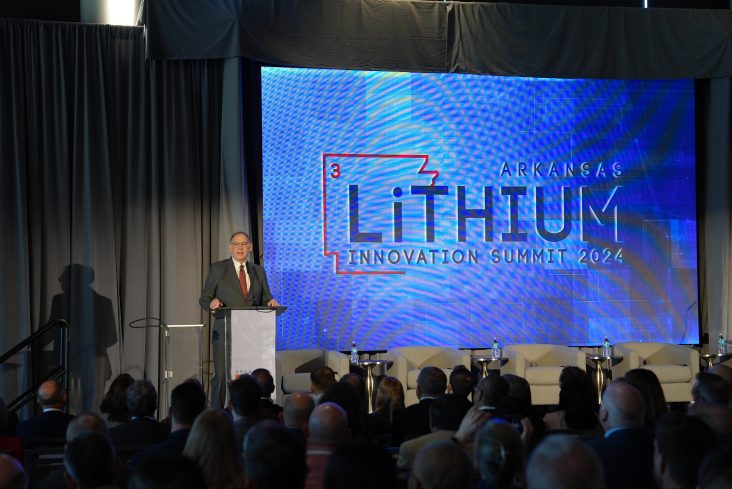ExxonMobil exec: Arkansas poised to be ‘center’ of lithium industry in North America
by February 15, 2024 8:00 pm 2,225 views

U.S. Senator John Boozman, R-Ark., addresses the first Arkansas Lithium Summit.
Arkansas can become the center of the lithium industry in North America, but success will require predictable and efficient regulations, fiscal competitiveness and certainty, and infrastructure, said Patrick Howarth, lithium global business manager for ExxonMobil.
“I believe that if we can do this together, we can achieve great things,” Howarth said at the inaugural Arkansas Lithium Innovation Summit in Little Rock Thursday (Feb. 15). “We have the opportunity to start a new foundational industry in Arkansas, and with that [comes] significant capital investment. That leads to economic development, which means jobs and opportunities, and really, and I think why many of you are here, it’s about additional revenue – individuals, businesses, and the states.”
Howarth was one of a number of speakers on the first day of the two-day summit, which brought to Little Rock nearly 700 energy sector executives, policymakers and stakeholders to discuss the growing lithium extraction industry in south Arkansas.
Howarth said in the last 12 months, ExxonMobil has built a leading acreage position in south Arkansas, started the state’s largest lithium drilling campaign, conducted engineering design work on multiple projects, and showcased its Arkansas projects to global customers. He said the state “could be the center of the industry here in North America.”
ExxonMobil aims to produce enough lithium to supply the manufacturing needs of one million electric vehicles per year by 2030, he said.
Howarth announced at the Summit that his company was creating the ExxonMobil Charitable Endowment for Southwest Arkansas. A $100,000 endowment will support education, quality-of-life and public safety initiatives in Lafayette and Columbia counties.
The excitement stems from Arkansas’ strategic position atop the Smackover Formation, a collection of saltwater brine 8,000 feet below the earth’s surface that stretches from Texas to Alabama. The formation contains rich deposits of lithium, the key component in batteries that power electric cars. Arkansas is the only one of those states that has a developed bromine industry, meaning an infrastructure is already in place to birth the new industry.
New direct lithium extraction technologies will enable the lithium to be extracted easily, more cheaply and in a more environmentally responsible way than traditional methods.
In her opening remarks, Gov. Sarah Sanders noted that while the industry is new and has many challenges, the state is already ahead of the curve thanks to its existing regulatory framework. She said the state is taking an “all-of-government approach on lithium.”
“Who knew that our quiet brine and bromine industry had the potential to change the world?” she said. “There are plenty of reasons for us to be bullish on Arkansas lithium. Frankly, we can do it cleaner here than it’s produced anywhere else in the world. No strip mining or huge evaporation ponds. Just wells that extract brine straight out of the ground. We can ensure America has a supply of this critical material, almost all of which currently comes from overseas, in large part from our number one adversary – communist China.”
Also speaking at the event were leaders of other companies with a growing presence in south Arkansas. Those included Robert Mintak, CEO of Standard Lithium; TETRA CEO Brady Murphy; and Wesley Hamilton, Albemarle’s chief technology officer for specialities. That bromine and lithium producer employs 675 in Magnolia, making it the largest private employer in Columbia County. In November 2020, it announced a multiyear investment of more than $500 million.
Standard Lithium’s Mintak said that when his company came to Arkansas in 2017 to look at the formation, no one was mentioning Arkansas as a potential major lithium source.
But Arkansas has turned out to be an ideal spot to develop the resource. He said the state is sitting on one of the most prolific lithium brine resources in the world, with the highest lithium concentrations in North America. Unlike other places with lithium deposits, Arkansas has an infrastructure in place. It has a regulatory environment favorable to development, available skilled labor, and enthusiastic support from Arkansas because the industry is established here.
“Comparing it to other projects in North America – I’m not trying to throw shade on anyone – there’s no reason anyone would go anywhere but Arkansas,” he said.
Among the other presenters was Andrew Miller, chief operating officer of Benchmark Mineral Intelligence, a consulting firm. He said the state has the opportunity not only to take a leading role in lithium extraction but also to establish positions elsewhere in the supply chain.
Miller said that in electric vehicles, the battery pack is the biggest cost, and the battery cell is the biggest part of that. But economies of scale are being achieved. The cost of producing batteries has fallen enough that raw materials are the cost driver.
To meet future needs, more projects are needed, but raw materials markets move more slowly than the electric vehicle market. It takes years if not decades to bring assets to production.
“Raw materials are now very much at the center of not just geopolitics, but they will guide the competitiveness of the automotive sector of the future,” he said.
Also speaking was Bob Galyen of Galyen Energy, another consultant. Galyen said he spent eight years in China helping build the world’s largest battery manufacturer. He said China is in a leadership position with electric vehicle technology because of government support, the private equity investment that followed that support, technologies, good quality machines, and trained and educated workers.
He said energy densities are improving while prices are falling. Meanwhile, battery manufacturers are becoming huge companies.
Galyen said manufacturers should locate close to the site of the materials to reduce the high cost of shipping and transportation. Moreover, Arkansas also would be a good place for a recycling facility.
